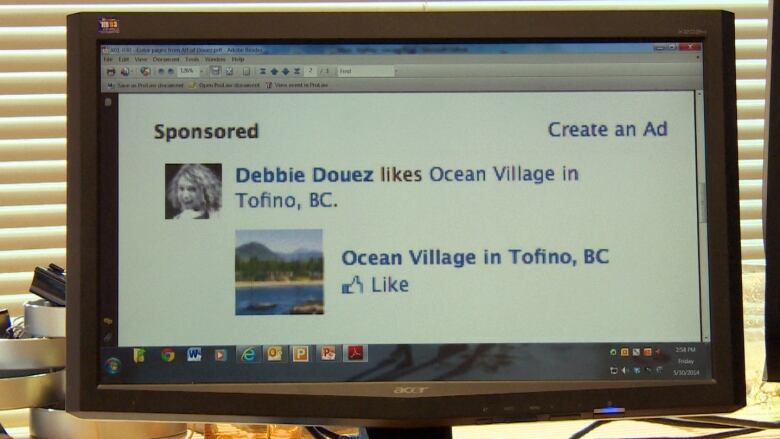Facebook to appeal class action lawsuit launched by Vancouver woman
Debbie Douez liked a company to get information on it and wound up endorsing it to all her friends
Social-media giant Facebook says it will appeal a court ruling that will allow a Vancouver woman to launch a classaction lawsuit against the company.
B.C.Supreme Court Judge Susan Griffin ruled yesterday that there is enough evidence to support allegations made byDebbieDouez that a Facebook advertising product used the names and images of members without their consent.
Griffin says the product, called "Sponsored Stories," included the names and images of members, an advertising logo and product information, which were sent to other Facebook members.
Griffin also says there's enough evidence to support allegations the company breached the province's Privacy Act.
The judge has suggested the parties arrange another hearing to address how class members will be notified, as well as any changes to the litigation plan.
Facebook says "Sponsored Stories" are no longer available to advertisers and the lawsuit has no merit.
Through the program, companies pay Facebook a fee so when their business is"liked" by users, thatinformation is published to the users' friends as proof of their endorsement.
Read more:
- 7 ways to control privacy on Facebook
- Social media privacy being taught at high school
- Government snooping may breach Privacy Act
- Facebook announces new privacy features for apps
- Facebook breaches Canadian privacy law: commissioner
Christoper Rhone, Douez'slawyer, arguesno one should be able to use your likeness andname to endorse a product without your permission, claiming it violates B.C.'s Privacy Act.
"When their names and portraits are being taken, and put into advertisements for the gain of the company, that's just wrong," Rhonesaid.

Douez, a Vancouver videographer, says that's exactly what happened to her. Two years ago she logged on to the Facebook site "Tough Mudders" and clicked on the "like" button because it was the only way to get more information on the fitness company's programs. She also "liked" Ocean Village Resort in Tofino.
The next thing she knew, her name and photo were popping up on her friends' Facebook pages endorsing the companies she knew little about.
Douez, who does some marketing work herself, says Facebook is going too far.
"I think there's a very fine line to providing a service and manipulating the public. And I think this is a situation where people are being manipulated and in particular, manipulated for commercial gain," she said.
Facebook says consent automatic
Facebook argues users automatically give their consent when they sign up, or when they click "like" or take so-called "social actions" on web pages.

Some media reports have suggested you can "opt out" of endorsing sites, but Douezdoubts that.
"I did change my privacy settings. In fact, I had the tightest privacy settings that you could have in a profile," she said.
"Yet, in this particular case, you are not allowed to opt out."
In its ruling authorizing the lawsuit, Griffin says one of the key questions to be decided is whether B.C. users of social media websites run by a foreign corporation have the protection of the B.C Privacy Act.
"Given the almost infinite life and scope of internet images and corresponding scale of harm caused by privacy breaches, BC residents have a significant interest in maintaining some means of policing privacy violations by multi-national internet or social media service providers," Griffin writes in her 74-page decision.
Griffin says the central issue in the lawsuit is whether Facebook's terms of use and the online tools it provides its users constitute consent to usethe person's name or portrait for advertising purposes.
Douezsaid other B.C. Facebook users are welcome to join the class action suit.
On mobile? Click here to read the B.C. Supreme Court decision
With files from Eric Rankin and The Canadian Press













_(720p).jpg)


 OFFICIAL HD MUSIC VIDEO.jpg)
.jpg)



























































































